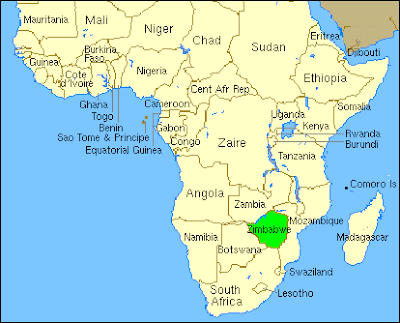

January 22, 2009
Africa's leaders have helped Robert Mugabe remain in power.
THE US Ambassador to Zimbabwe, James Mcghee, says Zimbabwe is a failed state. Cholera and malnutrition are bringing death everywhere while schools and hospitals have closed. Unemployment is 90 per cent, prices are doubling every day and barter has replaced a worthless currency — the Zimbabwean dollar had
13 zeros removed last year in a vain attempt to make it viable. Hundreds of thousands of Zimbabweans have fled to bordering countries.
But African leaders still refuse to intervene effectively.
Zimbabwe's President, Robert Mugabe, lost a close-run election last year to the Movement for Democratic Change (MDC) and its leader Morgan Tsvangirai, but he is hanging on by diplomatic bluff and bluster abroad combined with torture, murder and criminal neglect at home.
Cholera is spread in conditions of poor sanitation, where sewage can easily contaminate water supplies. It marks the breakdown of the most basic systems of public health. Aid agencies are trying to deliver clean water, antibiotics and rehydrating salts to treat the tens of thousands of people infected, but supplies are intercepted by officials. The UN figures of roughly 40,000 cases and 2100 deaths underestimate the situation because many die at home, often alone, too weak to seek treatment. The World Health Organisation estimates 60,000 cases are likely now the rainy season has begun washing even more human waste into the water supplies.
The economy is in its death throes, too. This week a 100 trillion Zimbabwe dollar was introduced, but all meaningful trade is done by barter or in foreign currency, illegally, amid inflation higher than 230 million per cent. Previously productive mines are now lethal places to work, as army officers have seized control and pocketed the dwindling revenue.
Yet the ruling Zanu-PF and Mugabe, its 84-year-old leader who has run Zimbabwe since 1980, still refuse to yield any power. As the country collapsed and the MDC won the elections but could not take office, South Africa, Botswana and Tanzania pushed Mugabe to the negotiating table.
The result was a deal for Zanu-PF to share ministerial power with MDC. But within days of the much-heralded agreement, Zanu-PF backtracked, refusing the MDC control of any ministries overseeing the security forces. The MDC rejected lesser portfolios because the ruling party's record of violence and intimidation meant an agreement was worthless without control of the police, since Mugabe and his cronies would never yield the army.
Recent events prove them right. In the past three months more than 40 MDC supporters have disappeared and others have been arrested and tortured. Abductions not only undermine the rule of law and weaken the political organisation of the MDC, they drive MDC spokesmen to aggressive condemnation of Zanu-PF. MDC criticisms are eagerly reported in international media alongside similar comments from Western leaders. This actually helps Mugabe, who simply claims that the MDC is the stooge of the West.
Information Minister Sikhanyiso Ndlovu shamelessly described the cholera outbreak as a "genocidal onslaught on the people of Zimbabwe by the British". Mugabe claimed that Britain and the US were using cholera as a cover for an invasion plan. Mugabe knows that by constantly blaming distant Britain and America for his country's ills, he makes it hard for democratic but awe-struck leaders in his own region to criticise the veteran revolutionary hero — some even seem ready to believe that Britain wants its colonies back. So Mugabe's lies still carry the day.
Although he should have known better, Thabo Mbeki, who was persuaded to resign in September as South African president and was negotiator of the power-sharing deal, followed Mugabe's lead and even rebuked Tsvangirai for looking to the West for help.
If Mbeki had shown any leadership, Tsvangirai would be president of Zimbabwe, but his successor Kgalema Motlanthe shows no sign of squaring up to Mugabe either. South Africa's stint on the UN Security Council has just ended, but its replacement, Uganda, stated right away that it also would oppose any UN action against Mugabe, just as Mbeki did, with Chinese and Russian support.
Although Mugabe is a murderous despot, he understands how to retain power.
Until Africa's democratically elected leaders can ignore his rhetoric, Zimbabweans are doomed.
With Barack Obama's inauguration causing a news frenzy all over Africa, he has the opportunity to shame those leaders into action.
Dr Roger Bate is a resident fellow at the American Enterprise Institute, a US think tank. He was refused entry into Zimbabwe earlier this month.
No comments:
Post a Comment